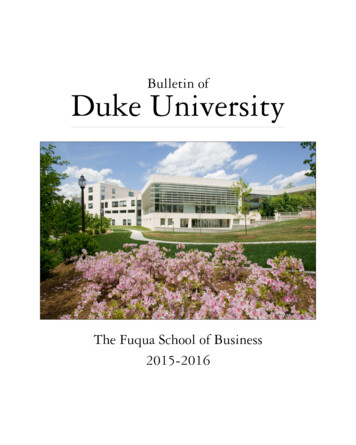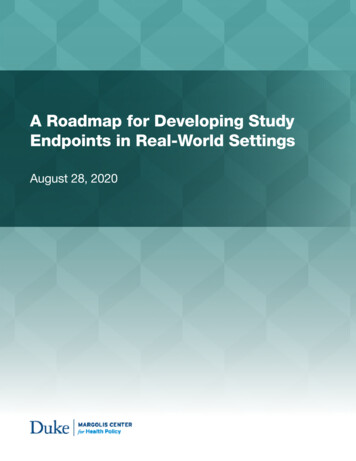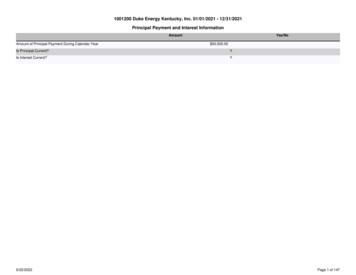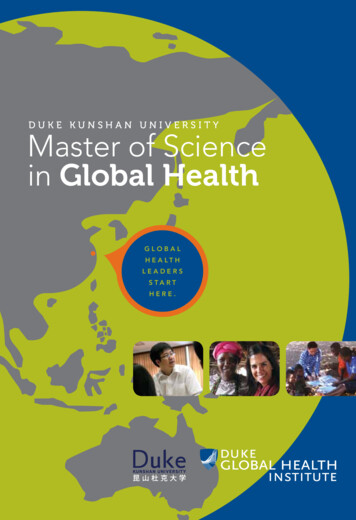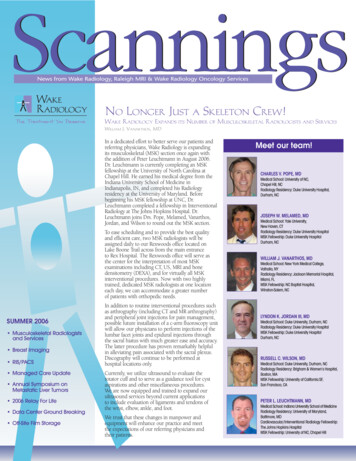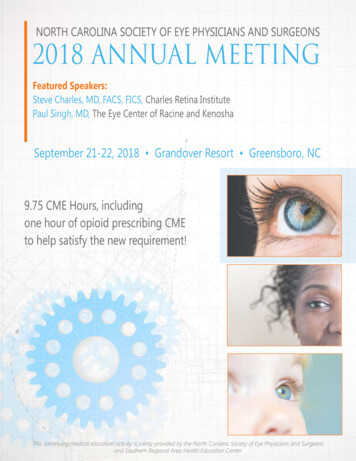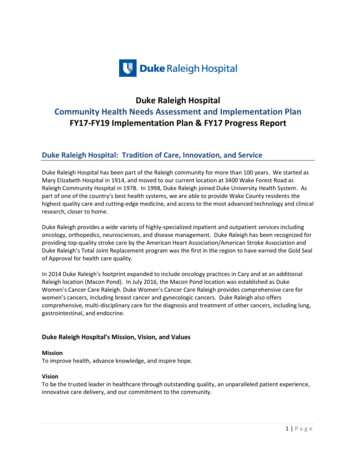
Transcription
Duke Raleigh HospitalCommunity Health Needs Assessment and Implementation PlanFY17-FY19 Implementation Plan & FY17 Progress ReportDuke Raleigh Hospital: Tradition of Care, Innovation, and ServiceDuke Raleigh Hospital has been part of the Raleigh community for more than 100 years. We started asMary Elizabeth Hospital in 1914, and moved to our current location at 3400 Wake Forest Road asRaleigh Community Hospital in 1978. In 1998, Duke Raleigh joined Duke University Health System. Aspart of one of the country’s best health systems, we are able to provide Wake County residents thehighest quality care and cutting-edge medicine, and access to the most advanced technology and clinicalresearch, closer to home.Duke Raleigh provides a wide variety of highly-specialized inpatient and outpatient services includingoncology, orthopedics, neurosciences, and disease management. Duke Raleigh has been recognized forproviding top-quality stroke care by the American Heart Association/American Stroke Association andDuke Raleigh’s Total Joint Replacement program was the first in the region to have earned the Gold Sealof Approval for health care quality.In 2014 Duke Raleigh’s footprint expanded to include oncology practices in Cary and at an additionalRaleigh location (Macon Pond). In July 2016, the Macon Pond location was established as DukeWomen’s Cancer Care Raleigh. Duke Women’s Cancer Care Raleigh provides comprehensive care forwomen’s cancers, including breast cancer and gynecologic cancers. Duke Raleigh also offerscomprehensive, multi-disciplinary care for the diagnosis and treatment of other cancers, including lung,gastrointestinal, and endocrine.Duke Raleigh Hospital’s Mission, Vision, and ValuesMissionTo improve health, advance knowledge, and inspire hope.VisionTo be the trusted leader in healthcare through outstanding quality, an unparalleled patient experience,innovative care delivery, and our commitment to the community.1 Page
Values“Caring for our patients, their loved ones and each other” through: Excellence: We strive to achieve excellence in all that we do. Safety: We hold each other accountable to constantly improve a culture that ensures safety andwelfare of all patients, visitors, and staff. Integrity: Our decisions, actions, and behaviors are based on honesty, trust, fairness, and thehighest ethical standards. Diversity: We embrace differences among people. Teamwork: We have to depend on each other and work well together with mutual respect toachieve common goals.As part of Duke Health, Duke Raleigh understands that health care means more than taking care ofpatients within the hospital and we are committed to executing initiatives and collaborating withcommunity partners to: Improve residents’ health status, Reduce health disparities, Increase accessibility to preventive services, Increase life spans, and Elevate overall quality of lifeDuke Raleigh Hospital is proud to be a part of the community, and has many longstanding partnershipswith organizations that share our goal of improving the health of the community.2016 CHNA Overview & PurposeEvery three years, Wake County conducts a comprehensive Community Health Needs Assessment(CHNA). From September 2015 through June 2016, Duke Raleigh collaborated with Wake CountyHuman Services, WakeMed Health and Hospitals, UNC REX Healthcare, Advance Community Health,United Way of the Greater Triangle, and the Wake County Medical Society Community HealthFoundation to develop the 2016 Community Health Needs Assessment (CHNA). The purpose of a CHNAis to identify factors that affect the health of a population and determine the availability of resourceswithin the community to adequately address these factors.This assessment included analysis of existing statistics from local, county, state, and national sources aswell as community input gathered from Wake County residents through surveys, focus groups, andprioritization meetings. Based on the findings from this assessment, the following four priority areashave been identified for 2017-2019:1.2.3.4.Health Insurance CoverageTransportationAccess to Health ServicesMental Health and Substance Use.A full copy of the report can be found l.pdf2 Page
FY17-19 Implementation Plan & FY17 Progress ReportIn alignment with Duke Raleigh Hospital’s mission, the FY17-19 implementation plan was developed.This plan is guided by the priority areas identified as well as by our core competencies in order to focusour efforts in the areas where Duke Raleigh can have the greatest impact.This implementation plan is considered to be a “working plan” that will continue to evolve and beevaluated for effectiveness in meeting the needs of the community. Following is more detailedinformation regarding the four priority areas as well as the actions Duke Raleigh has identified toaddress the priority areas.HEALTH INSURANCE COVERAGEAccess to health insurance coverage was identified as one of the most important issues impacting thequality of life of Wake County residents. This issue not only encompasses those who lack insurance, butalso those that are underinsured as well as those under government programs such as Medicare andMedicaid. Concerns were also expressed regarding the complexity of the health care system andconfusion regarding how health insurance works.To address this priority Duke Raleigh will employ the following strategy along with outlined action items:PriorityHealth Insurance CoverageStrategy Statement Reduce barriers to accessing care for the uninsured and underinsured.Major Actions Continue to provide financial assistance via Duke University Health System’s charity anddiscounted care policies. These policies provide eligible care at a discount or without chargeto all qualifying patients who do not have health insurance, or because of financial hardshipcannot pay for the care they receive. Continue to utilize financial care counselors to help patients understand their financialresponsibilities and connect patients with community resources. Continue to help patients navigate through government-sponsored financial-assistanceprograms for which they may qualify. Continue to provide support to organizations such as Alliance Medical Ministry and UrbanMinistries Open Door Clinic, which provides affordable healthcare to uninsured adults inWake County. Continue to provide in-kind support to Project Access of Wake County, a private, non-profitprogram that connects eligible uninsured clients to high quality medical services donated byphysicians. In FY2017, Duke Raleigh Hospital provided 2.8M in donated care up from 2.2M in FY2016 to Project Access of Wake County clients. Continue to provide health literacy course through our clinical education department, whicheducated over 40 clinicians in FY17.TRANSPORTATIONAccess to and cost of transportation has implications on one’s health as lack of timely transportation canimpact the ability to make physician appointments and obtain prescriptions particularly for our elderly3 Page
and most disadvantaged residents. To address this priority Duke Raleigh will employ the followingstrategy along with the outlined action items:PriorityStrategy StatementTransportationLessen barriers to care as it relates to access to and cost of transportationthrough collaborations within the hospital and with our community partners.Major Actions Continue to employ multidisciplinary approaches within the cancer center to facilitatemultiple appointments in the same day thereby reducing transportation needs. Continue to employ the DUHS resource center in assessing and addressing any barriers,including transportation that may impact a patient’s ability to get to their follow-upappointment. Continue to support organizations such as the Greater Raleigh Chamber of Commerce andMidtown Raleigh Alliance, which advocates for an enhanced transit system for all residents. Continue to support organizations such as the Lung Cancer Initiative of NC, which funds a gascard program to lessen the financial burden of lung cancer patients seeking treatment whoneed assistance.ACCESS TO HEALTH SERVICESAccess to health services is key to improving community health and residents health status1. Thispriority relates to the utilization of existing health facilities, the ease of accessing health resources, andprimary and preventive care/screenings.This was identified as a top priority based on feedback from focus groups and surveys as well as the rateof preventable hospital stays for conditions such as diabetes, COPD, asthma, heart failure, bacterialpneumonia, UTI, and dehydration. Also, the complexity of navigating the health care system,affordability of health services, and provider availability arose as key concerns related to access tohealth services.Duke Raleigh as well as Duke Health is actively engaged in improving access to health services for allresidents through strategic initiatives as well as through strategic community partnerships.PriorityStrategy StatementAccess to Health Care ServicesEnhance access to care in the right setting with an increased focus on primarycare, preventative care, disease management, and education throughout thecommunity.Major Actions Duke Primary Care, an entity of Duke University Health System, continues to evaluateopportunities to expand access to the growing Wake County population, adding two practicesand relocating one practice in FY17 Continue to improve the discharge process to ensure that discharged patients are connectedwith primary care resources.1In Appendix 2: Secondary (Existing) Data Analysis – Health Status (Infectious and Chronic Disease and othercauses of death) – pp107 – 116, identified breast cancer mortality, prostate cancer mortality, cerebrovascularmortality, and diabetes as some of the areas of improvements4 Page
Continue work of the DUHS Resource Center in following up with discharged patients toensure they are scheduled for the appropriate follow-up to reduce likelihood of unnecessaryreadmissions. This includes connecting homebound patients without primary care toorganizations that perform home visits.Continue partnership with Wake EMS and area hospitals on triage and destination plan forstroke patients.Continue to provide in-kind lab services to Urban Ministries Open Door Clinic to facilitate thecare for those who lack adequate income, insurance coverage, and other means to healthservices. In FY17, this in-kind donation was valued at 1.8M.Continue to provide diabetes education to Alliance Medical Ministry patients. This educationis offered by certified diabetes educators through Duke Specialty Rehab Services MidtownStrengthen support of Alliance Medical Ministry and Urban Ministries through increasedemployee volunteerism in efforts to expand their capacity and ability to serve patients. InFY17, Duke Raleigh hosted a day of service where over 30 employees volunteered their timeto pack 1,000 lbs of rice & beans for Urban Ministries’ client choice food pantry. For the pasttwo years, Duke Raleigh employees volunteered at Alliance Medical Ministry as part of theTriangle-wide MLK Day of Service. Duke Raleigh continues to evaluate opportunities for onetime and on-going service opportunities for these and other community partners.Continue programs through the Duke Specialty Services Rehab Midtown, which offers avariety of programs designed to help people lose weight and make healthy lifestyle changes.Services offered include pulmonary rehabilitation programs, personalized diabetesmanagement plans, multidisciplinary therapy for neurological disorders, physical therapy,occupational therapy, speech therapy as well as cardiovascular and strength trainingequipment.Continue community education, Healthy Focus Seminars with efforts to expand attendance toinclude populations throughout Wake County as well as a focus on topics aligned with theneeds assessment. In FY2017, we launched the 11th year of the Health Focus education serieswith topics including, but not limited to cancer, cardiovascular disease, and stroke.In FY2017, Duke Raleigh continued to sponsor Midtown Farmers Market, which promotes ahealthy lifestyle as well as provides a venue for Duke Raleigh to share healthy education.Expand and strengthen community outreach efforts around stroke, cardiovascular disease,diabetes, cancer, orthopedics and sports medicine along with our community partners. InFY2017, we participated again in the 4th Congressional District Health Fair where our strokechampions provided health education.MENTAL HEALTH AND SUBSTANCE USEWake County has experienced an increase in the prevalence and severity of mental health andsubstance use problems. This priority relates to tobacco use/exposure, illegal drug use, excessivedrinking, alcohol-impaired driving deaths, suicide rates, mental health emergency department utilizationand the availability of resources to meet this growing demand.2:Due to the scope and complexity of mental health and substance use issues, a collective andcollaborative approach is needed. Below is a listing of a number of initiatives and collaborations thatDuke Raleigh Hospital is engaged with to have the greatest impact to address this issue:2See 2016 Wake County CHNA, Appendix 2: Secondary (Existing) Data Analysis, pages 74-86.5 Page
PriorityStrategy StatementMental Health and Substance UseAddress community mental health and substance use needs by collaboratingwith community partners and working collectively to leverage resources.Major Actions Continue to participate in the Wake County Crisis Hospital Collaborative, which includes allWake County Hospitals, representatives from mental health, law enforcement and otherstakeholders in crisis response in Wake County. Continue to convene treatment team meetings for inpatients who also have substance useand chronic persistent mental illness with complex needs. The treatment team includes carecoordinators from mental health agencies, Alliance Behavioral Health and other providersinvolved in the patient’s care. Continue regular meetings with Duke Raleigh Hospital case management, Alliance BehavioralHealth, case manager with Community Care of Wake and Johnston Counties (CCWJC), andEMS to address barriers to care for high risk patients and reduce non-emergent visits tohospitals. Continue to utilize Community Care of Johnston & Wake Counties portal and the NorthCarolina Controlled Substances Reporting System (CSRS) to reduce narcotic dependency andprevent overprescribing. Continue support of organizations such as National Alliance on Mental Illness (NAMI) WakeCounty, which provides support, education, and advocacy for people with mental illness alongwith their families and friends. Strengthen support of Triangle Family Services, which focuses on building a strongercommunity by strengthening the family through family safety, financial stability, and mentalhealth. Continue tobacco cessation support for employees and dependents through LIVE FOR LIFE’sSteps to Health Tobacco Cessation program. This 12-month coaching program involves aninitial consultation to develop a quit plan, then follow-up calls at one, three, six, and 12months. Coaches provide additional resources and motivation to help participants quit.Enrollment also includes access to three months of low-cost treatment at participating DukeHospital Outpatient Pharmacies.6 Page
Human Services, WakeMed Health and Hospitals, UNC REX Healthcare, Advance Community Health, United Way of the Greater Triangle, and the Wake County Medical Society Community Health Foundation to develop the 2016 Community Health Needs Assessment (CHNA). The purpose of a CHNA

